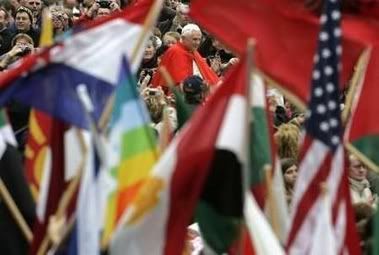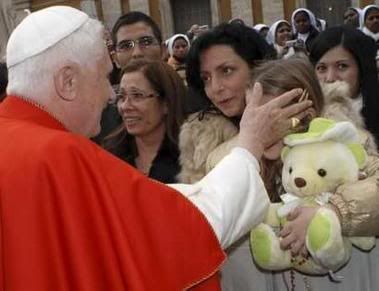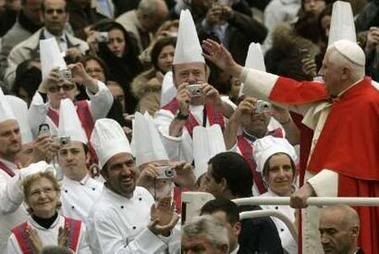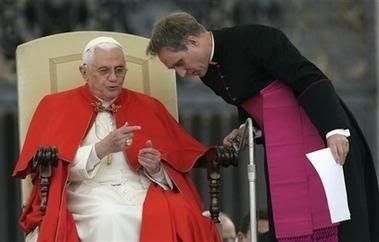
From Vatican Square at Today's Wednesday Audience
Of course not all the Church Fathers were "white". Many were not of course(trying to market the title thread). Today the Pope is again talking to us(All One billion of us not just the people in Vatican Square) during his Wednesday Audience about the Church Fathers. Today is part II on Saint Jerome. If you wish to read what he said last week go see The Pope Speaks_-Pics and Translation From Today's Wednesday Audience-Pope Talks St Jerome and the Bible .
I think it is a good idea to step back and ponder why the Pope is spending so much time in his publc audiences talking about these people. In a foreword to a book on the Church fathers I read some time back ,I was struck by an observation as to Vatican II. The view was back when that great Council was happening that the council would be followed by a great rebirth of study and living the thought of the Church Fathers. When we hear hear that Vatican II was for "getting back to the "basics" , it should be noted that the Church Fathers were a suppose to be a important part of the mix. . Well it didn''t happen. The author stated untill it does the true fruits of Vatican II would not happen. I agree.
Yesterday I posted More On the Pope's Incredible Letter on St. John Chrysostom . In that letter(which can found at the link) the Pope said:
"Therefore, what greater wish could I express to theologians than for their renewed commitment to recover the sapiential patrimony of the Holy Fathers? It cannot but produce a precious enrichment for their reflection, even on the problems of our times".
Now the Holy Father is not only wanting the Church Fathers to be the domain of "theologians". IF that were the case he would not be spending basically over a year on this topic to his main weekly address to over 1 billion Catholics. I suspect the Pope agrees that for the "true fruits" of Vatican II to be realized the average joe Catholic must aquaint himself again with this great Patrimony.
That being said lets move on to today Thanks again to the Ratzinger Forum for the quick translation and the great pics(more there) from today's Wednesday Audience and the great pics. I am putting more pics up today tha I usually do because this selection is so good.
Pope Benedict talks to relatives of the victims of a bomb attack against Italian forces in Nassiriya, Iraq four years ago, at the end of today's general audience.
Here is a translation of the Holy Father's catechesis at St. Peter's Square today.
Dear brothers and sisters!
We will turn our attention today to St. Jerome, a Father of the Church, who placed the Bible at the center of his life: he translated it to Latin, he commented on it in various works, and above all, set out to live it concretely in his long earthly existence, notwithstanding the difficult and fiery nature for which he was also known. Jerome was born in Stridone around 347 to a Christian family, who assured him of a thorough education, even sending him to Rome to complete his studies. As a young man, he felt the attractions of worldly living (cfr Ep. 22,7), but his desire for and interest in the Christian religion prevailed. Baptized around 366, he was drawn to the monastic life, and going to Aquileia, he joined a group of fervent Christians, whom he described as almost 'a choir of the blessed' (Chron. ad amm. 374), who had gathered around the bishop Valerian. Later, he left for the Orient and lived as a hermit in the desert of Calcide, south of Aleppo (cfr Ep. 14,10),dedicating himself to serious study.

It is interesting to highlight the criteria that the great Biblical scholar used in his work as a translator. He revealed them himself when he stated that he respected even the order of words in Sacred Scripture, because, he said, "even the order of words is a mystery", that is, a revelation. He also reiterated the need to turn to the original texts: "Whenever a question is raised among Latin readers about the New Testament because of discordant readings of the texts, we must turn to the original, that is, the Greek text in which the New Testament was first written. Likewise for the Old Testament, if there are divergences between the Greek and Latin texts, let us turn to the original text in Hebrew. In this way, everything that flows from the spring, we shall also find in its rivulets" (Ep 106,2). Jerome also commented on several Biblical texts. For him, commentaries should offer many opinions "so that the astute reader, after reading different explanations and getting to know different opinions - to accept or to reject - may judge which one is most reliable, and like a currency expert, reject the counterfeit" (Contra Rufinum 1, 16). With energy and liveliness, he refuted the heretics who contested the tradition and faith of the Church. He also showed the importance and validity of Christian literature which was now worthy to confront classical literature. He did this in De viris illustribus, a work in which he presented the biographies of more than a hundred Christian authors. He also wrote biographies of monks, illustrating the monastic ideal alongside other spiritual itineraries, and translated various works by Greek authors. Finally, in the important Epistolary, a masterpiece of Latin literature, Jerome emerged with his most important characteristics as a man of culture, ascetic and spiritual guide. What can we learn from St. Jerome? I think, above all, it is this: to love the Word of God in Sacred Scripture. St. Jerome said, "Not to know Scriptures is not to know Christ." That is why it is important that every Christian live in contact and in personal dialog with the Word of God, given to us in Sacred Scripture.

This dialog should be truly personal, because God speaks to each of us through Sacred Scripture and has a message for each of us. We should read Sacred Scripture not as a word from the past, but as the Word of God addressed even to us, and we must seek to understand what the Lord is telling us. But in order not to fall into individualism, we must also keep in mind that the Word of God is given to us in order to build communion, to unite us in the truth along our way to God. Therefore, the Word of God, while remaining a personal word, is also a word to build community, to build the Church itself. So we should read it in communion with the living Church. The privileged place for reading and listening to the Word of God is the liturgy, in which, by celebrating the Word and rendering the Body of Christ present in the Sacrament, we actualize the Word in our life and make it alive and present among us. We should never forget that the Word of God transcends time. Human opinions come and go. What is very modern today will be old tomorrow. But the Word of God is the word of eternal life, it carries eternity in itself ,and therefore is valid for always. Carrying the Word of God, we carry in us the eternal, life eternal. So I conclude with a statement of St. Jerome to St. Paulinus of Nola, in which the great exegete expresses that fact, that in the Word of God, we receive eternity, life eternal: "Let us seek to learn on earth the truths that will remain valid even in heaven" (Ep. 53,10).


















No comments:
Post a Comment